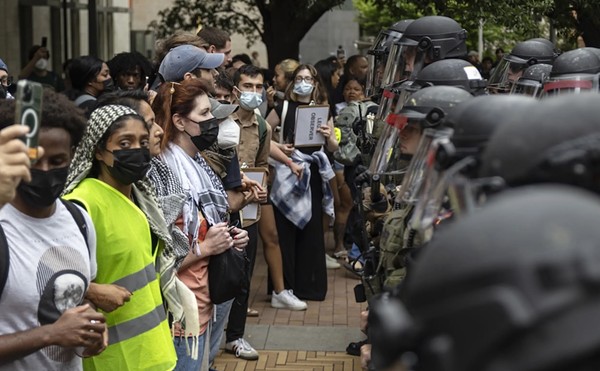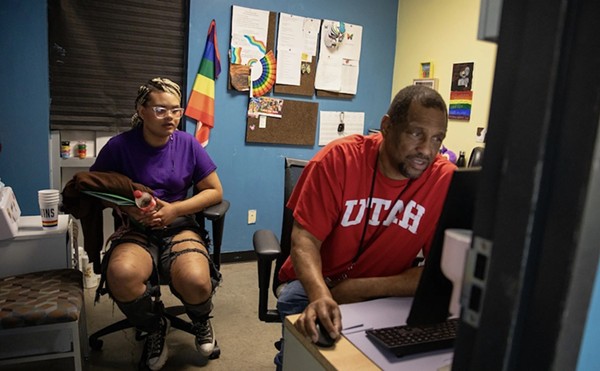Private gains, public pains
In June 2011 staff at the South Florida State Hospital began to worry Luis Santana, who'd long battled mental illness, had slipped into another psychotic episode, writing in reports that Santana was "pacing, restless, repeatedly flushing the toilet." Some hours later hospital staff put Santana, pumped with six powerful psychiatric meds, into a hot bath.
Staff later discovered Santana's dead body in the scalding water, the skin "sloughing" off his face. That's according to an investigation by the Florida Department of Children and Families last year into Santana's and two other questionable deaths at the 335-bed facility operated by the GEO Care, a wholly-owned subsidiary of the private prison corporation GEO Group.
This summer, just as the Associated Press first reported on the three gruesome deaths at GEO's South Florida psychiatric hospital, GEO was ramping up efforts to take over management of a similar facility in Texas. In a quiet, largely overlooked budget rider last session the Legislature told Texas Department of State Health Services to seek bids from private companies to run one of Texas' public psychiatric hospitals — the caveat being the company could somehow run the facility at 10 percent below what Texas currently spends, all while managing to eke out a profit.
Only GEO responded to the bid, and according to those with knowledge of the proposal GEO has its eyes on the Kerrville State Hospital, where courts every year send hundreds of incarcerated criminal defendants declared incompetent and unable to participate in their own defense, so-called "forensic commitments."
As DSHS reviews GEO's proposal — the agency's set to deliver its findings and recommendation to the Governor's office and the Legislative Budget Board this month — advocates, government watchdogs, and mental health care providers bemoan the prospect of turning Kerrville over to GEO.
As Maria Ramos, a social worker and board member with the ACLU of Texas, put it in a Houston Chronicle editorial this month, "There's a scandal waiting to happen if GEO Care gets its hands on another Texas mental health hospital."
This summer a coalition of civil rights, mental health, labor, public policy, and faith-based organizations signed a letter urging DSHS to reject the GEO Care bid. GOP state Rep. Harvey Hilderbran, who represents Kerrville, openly opposes the prospect of privatizing the Kerrville State Hospital. "I'm not necessarily opposed to privatization – you've got to take it on a case by case basis – but in this case there are a lot of potential problems," Hilderbran said. He's troubled that GEO was the sole bidder and worries the company would save money at the expense of quality care and employee benefits.
Last week Hilderbran sent a letter to DSHS urging the agency to reject the proposal. "[The Kerrville State Hospital] has a strong reputation of providing high quality service to its patients," he wrote. "I have serious concerns that privatizing the hospital will result in a dramatic, harmful reduction in the quality of service."
GEO spokesman Pablo Paez declined by email to discuss details of the Kerrville proposal. Meanwhile a series of health and safety compliance reviews by the DSHS conducted this year raises serious concerns over care provided at GEO's Montgomery County Mental Health Treatment Facility, Texas' first publicly-funded, privately-run psychiatric hospital. DSHS found a litany of violations at the facility ranging from unauthorized seclusion to keeping patients hospitalized months after they'd been found competent to stand trial. In its review of the facility, DSHS's state hospital division noted serious injuries and incidents that were never reported to the state — like one inmate who seriously harmed himself before eating fecal matter. Classes designed to rehabilitate patients were described as "bedlam."
In internal DSHS emails reviewed by the Current, State Hospitals Section employee Jo Ann Elliott wrote to colleagues about one particular case of neglect at the Montgomery County facility: "While in seclusion for four hours, [a] patient banged his head on the seclusion window and walls, causing lacerations to both eyes and a bruise to the head. Patient threatened staff if door was opened. No physician assessment during this time. Why was [restraint] not considered to protect the patient from self-harm?"
Elliot adds, "No physician assessment occurred during the 4 hour seclusion. The lack of action by staff would be a reportable incident to DFPS [Department of Family and Protective Services] in one of the state hospitals."
DSHS has filed a notice of violation with the facility, fining GEO over $100,000, said agency spokesman Carrie Williams. She declined to comment on whether GEO's past performance at Montgomery County and elsewhere will impact DSHS's assessment of GEO's Kerrville proposal. DSHS has no public hearings scheduled for the GEO proposal.
Beyond Montgomery County, GEO, once known as Wackenhut, has a history of problems at its other Texas facilities. In the late 1990s Wackenhut hired a convicted sex offender as a guard at the Coke County Juvenile Justice Center, which then held young women. The guard sexually assaulted a 15-year-old detainee. Later in 2006 and 2007, officials found GEO had hired another sex offender as a guard at the facility, who then sexually assaulted several inmates.
Texas ultimately shuttered the Coke County facility in 2007 amid reports of squalid conditions, sexual abuse, and youth suicide.
In 2009 inmates rioted at GEO's West Texas Reeves County Detention Center, claiming prisoners were dying from poor medical care. The ACLU helped the family of one inmate sue the company after the man died from an epileptic seizure in solitary confinement. Beyond Texas, GEO's history grows even more clouded.
At the South Florida State Hospital, investigators wrote that they were concerned GEO staff had perhaps tried to cover up Santana's death in the scalding-hot bathtub (GEO staff hadn't reported his death as required), and noted a 30-minute gap in staff observation. State investigators randomly checked water temperatures in baths at the facility last October, according to the investigator's report, finding temperatures as high as 126 degrees — exposure to temperatures of more than 120 degrees for more than five minutes can result in third degree burns.
That same month James Bragman, a 50-year-old schizophrenic patient, while being escorted by three GEO staffers for a hospital visit, jumped to his death from the eighth floor of the hospital parking garage. A review of his records showed he had a history of such suicide attempts, and just months before the incident had been deemed a "high risk for suicide and intentional self-injury."
Later that Summer a woman died at the facility after "someone put her head through the wall in her room," the report states.
By email, GEO spokesman Paez declined to answer questions about the South Florida deaths, saying the company has reduced average stays, seclusion and use of restraints at the facility. He classified problems at Montgomery County as "paperwork lapses."
"All residential treatment facilities in the world (including psychiatric hospitals), public or private, face operational challenges that are inherent in the management of mental health populations," he wrote. "GEO has always conducted its operations with a commitment to providing high quality services and adhering to industry leading standards."
Still this year a Justice Department investigation into GEO's Walnut Grove Youth Correctional Facility in Mississippi concluded GEO officials turned a blind eye to sexual misconduct by staff with young inmates while also ignoring medical needs and suicidal behavior. In April a federal judge wrote the youth prison "has allowed a cesspool of unconstitutional and inhuman acts and conditions to germinate, the sum of which places the offenders at substantial ongoing risk." GEO didn't attempt to renew its Walnut Grove facility contract or two others at Mississippi jails.
Watchdog groups worry GEO will continue to work its political connections to score another contract here. Stephen Anfinson, who headed the Kerrville facility until 2011, began working for GEO shortly after leaving the facility to oversee GEO's psych hospitals. Government watchdog groups like Public Citizen have complained Anfinson's insider knowledge of the facility gives GEO unfair advantage.
With the state currently spending about $27 million to run the Kerrville hospital each year, a contract for GEO could be lucrative. The 202-bed facility is almost always at capacity thanks to the mentally ill defenders that clog our criminal justice system. Meanwhile, many doubt GEO could maintain Kerrville's standard of care while spending 10 percent less and make a profit without cutting corners. "We already have the lowest-cost mental health care system here in Texas," said Leon Evans, president and CEO of the Center for Health Care Services in San Antonio. According to the Kaiser Family Foundation and the National Alliance on Mental Illness, Texas spends less per capita on mental health care funding than any other state.
"People with mental illness aren't criminals, and [GEO's] history of working with criminals isn't even that good," Evans said. "If your main mission is to make a profit and house people, then your main mission is not to produce great outcomes and help people recover."
Mental health care experts in Texas like Evans have urged the state to boost front-end treatment solutions such as getting people in community-based treatment programs before a mental illness spins out of control and lands them in jail (and eventually the state hospital).
With Kerrville right at the nexus of incarceration and mental health care, advocates like Bob Libal with the nonprofit Grassroots Leadership worry GEO would operate with the same goal in psychiatric hospitals as in prisons — to keep beds full.
"There's no incentive for private prison corporations to support strategies that reduce incarcerations," he said. "When they're in the market for psychiatric hospitals, they'll want to make sure that system keeps beds full, too."



















